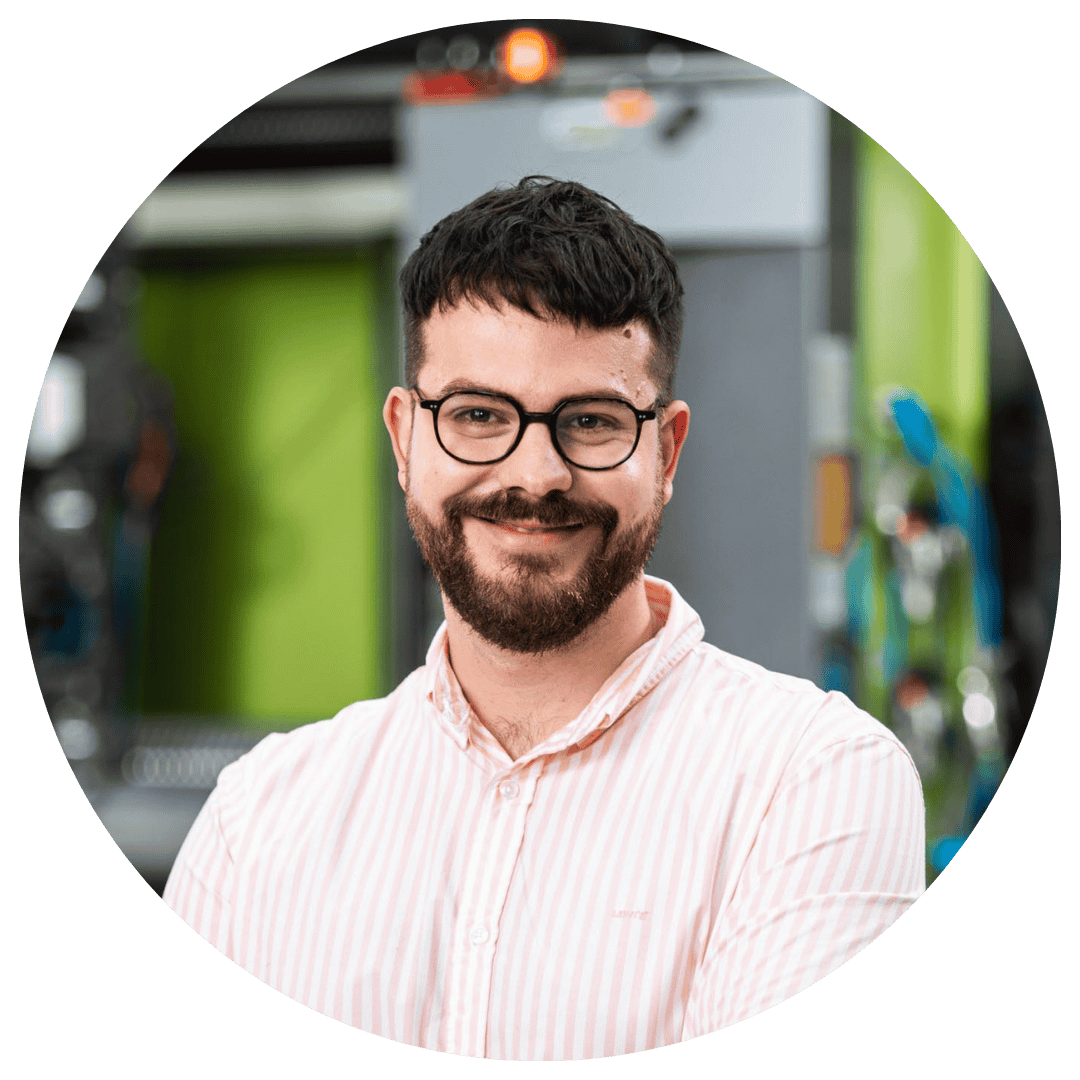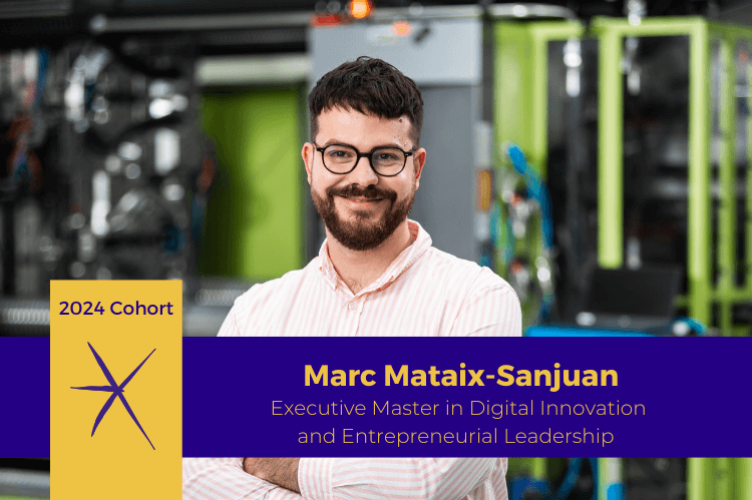Executive Master in Digital Innovation and Entrepreneurial Leadership
Meet the 2024 cohort: Marc
 As the CFO and Head of the IT department of PFAFF Werkzeug- und Formenbau, Marc is on a mission to make Industrial Tech sexy again. He joined the Executive Master in Digital Innovation and Entrepreneurial Leadership (EMDIEL) in September 2024. We asked him about his personal mission and vision, how he approaches them, and what role he hopes the EMDIEL will have in his quest.
As the CFO and Head of the IT department of PFAFF Werkzeug- und Formenbau, Marc is on a mission to make Industrial Tech sexy again. He joined the Executive Master in Digital Innovation and Entrepreneurial Leadership (EMDIEL) in September 2024. We asked him about his personal mission and vision, how he approaches them, and what role he hopes the EMDIEL will have in his quest.
ESCP: Marc, you describe yourself as an untypical CFO. What distinguishes your approach to looking at numbers from the traditional perception of a CFO’s job?
Marc: I think a CFO should be more of an enabler of innovation rather than the traditional “brake” everyone assumes. I’m constantly challenging the status quo—especially when it comes to business plans and budgets.
I like to ask, “Will we still be doing things this way in five years?” The answer is usually no. That’s when I start digging deeper, asking the questions that lead us to what could be different—and that’s where the innovation kicks in. Of course, this demands a major mindset shift and an improvement in the company’s error culture.
The big question I used to hear was always, “How can we involve the customer if it’s not 100% perfect?” Honestly, I couldn’t answer that until I started the EMDIEL programme.
I’m also a big believer in what Tendayi Viki from Strategyzer says: if the CFO of an industrial company adopts a venture capital mindset, they can bring discipline to innovation. Instead of putting all our eggs in one basket—like approving a big R&D project only once it’s fully developed—I prefer to split the investment into smaller, bite-sized chunks. This way, we can explore more ideas and get the marketing team involved earlier, so they can test these concepts with customers. It’s all about staying flexible and adaptable.
ESCP: With your double role as CFO and head of the IT department at a manufacturing company, which synergies do you hope to leverage between the Finance and IT teams?
Marc: The idea behind this dual role came from the need to centralise control over the data we generate as a company. Finance, at the end of the day, gives us the numbers that reflect how well we’ve performed over a certain period. But understanding those numbers in isolation doesn’t give you the full picture.
That’s why, in 2021, we decided to separate finance from accounting—basically, separating the interpretation of our financial data from the generation of it.
At the same time, we brought IT (which for us is largely our ERP system, covering production and client data) under the same umbrella as finance. The result? We now have a comprehensive view of all the data being generated, which makes it much more efficient to build out BI and make better, more informed decisions as a company. It's all about connecting the dots between different data streams so we can operate more effectively.
ESCP: You're on a mission to make Industrial Tech sexy again. What does this look like to you?
Marc: In my opinion, sexiness in industrial tech is the same as in any other industry: first, you know you want a product from a company, and then you figure out why.
It’s that feeling of FOMO—like if you don’t get your hands on this product, you’re missing out on something big. This concept is much clearer in B2C — think Apple, Prada, or Porsche. But I firmly believe that this same sexiness can be brought back to industrial tech.
Stubborn as I am, I refuse to believe that price is the only thing driving industrial tech. I believe value does — and it’s a much more complex concept. It’s developed by staying extremely close to your customers, being truly empathetic, and humble enough to understand their real needs. And here’s the key difference: in industrial tech, this “indispensable” feeling is much tighter to the team because the number of people involved is smaller than in the B2C world. That’s why it needs to be far more human-centric than in other industries. You can’t hide behind mass markets or flashy campaigns; it’s all about building genuine relationships and trust.
Thanks to the EMDIEL, what was once just my belief is now transforming into a structured, scientific approach.
ESCP: After completing module 1 in Berlin last month, how do you think the EMDIEL will help you to leverage synergies but also to pay into your mission of making Industrial Tech sexy again?
Marc: The first EMDIEL module in Berlin felt like an indulgent Italian Christmas dinner—absolutely fantastic, but I’m still digesting it! And I mean that in the best possible way.
I realised that I’d been a bit “corseted” by my deep knowledge of finance. In finance, we tend to rely heavily on theories that are all about interpreting the past. But that first module? It blew that corset wide open. I’ve come to see that there’s a lot I didn’t know, and it’s helping me to ground the intuition I’ve developed over the last five years in an industrial company with real, solid science.
While it’s still early days, I’ve already gained the tools (if not yet all the knowledge) to start bridging the gap between today’s business plans and what the R&D department will need five years from now— even when the uncertainty feels overwhelming.
It’s also helped me shake off that “knowledge anxiety” I used to feel when talking with the digital techies. Now I understand their mindset better, which means I can communicate more clearly with our digitalisation team and external app developers—and that’s brought us some serious traction.
Finally, and perhaps most importantly, the programme has really helped me improve how I communicate with my team and pitch my ideas to the people I need support from. It’s been a game-changer in terms of collaboration.
ESCP: All EMDIEL participants have to develop and work on an individual project during the programme. Can you share with us a general idea of what you are planning to do and why?
Marc: This is probably the toughest question of all, but it also highlights just how powerful the knowledge from this master’s programme is.
I’m torn between two very different projects: one is a mental well-being inclusive gym startup that’s completely unrelated to my current job, and the other is a corporate project within PFAFF to restructure our innovation activities.
The beauty of the EMDIEL? It’s given me the tools to embrace these choices without panicking. They always say: anyone can be an entrepreneur, but not every idea is meant to be executed. After a few weeks of testing both ideas, I’m leaning toward the corporate project.
The reason? Given my growing entrepreneurial mindset (which, trust me, is still very much a work in progress) and the fact that I feel equally passionate about both projects, I think the smart move is to go with the one where I have more resources — especially the non-material ones — more exposure, and more connections. So, restructuring innovation at PFAFF seems like the right choice for now.
Campuses
